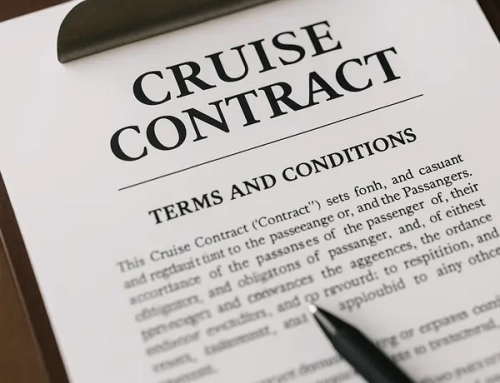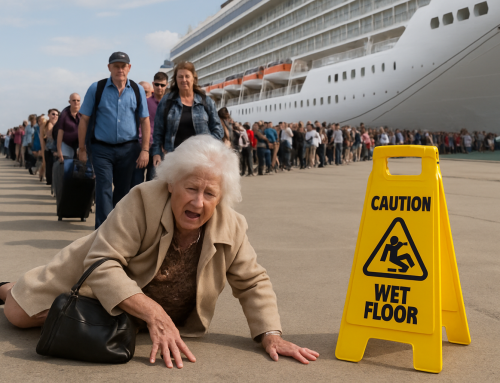Falling Over the Edge of the Infinity Pool
We all saw what happened recently on a cruise from hell on the Icon of the Seas where a Royal Caribbean crew member passed away after going overboard following an altercation with another crew member. On that same cruise it looked like there might have been a second death went a passenger seemingly went over the edge of the “Hideaway” infinity pool. From the video the man appears to have disappeared to the ocean or the decks below after being up ended over the edge. However, luckily, what you do not see in the short clip, wound up in the gutter of the infinity pool. There’s a small border that catches the water and apparently passengers who fall over. He apparently was trying to grab his sunglasses, when he went over the edge. We do not know all the details yet but it is being reported that he is ok. Maybe the drinks were flowing a little to much for him to make that judgment call to risk everything for some sunglasses.
Now you’re wondering: Can you sue Royal Caribbean for your injuries if you go over the edge of the infinity pool?
Like many cruise ship injury cases, the answer isn’t as simple as yes or no. It all comes down to a legal concept known as comparative negligence—and also whether the cruise line should have foreseen and prevented the accident you may have caused yourself.
Let’s break it down.
The Cruise Ship’s Duty of Care Is Not Absolute
Cruise lines like Royal Caribbean owe passengers a reasonable duty of care. This means they are required to maintain the ship in a safe condition, warn of hidden dangers, and take steps to prevent foreseeable injuries. But that duty has limits.
They are not responsible for protecting passengers from every possible foolish or reckless action, especially if the passenger’s own behavior caused the injury.
If you were intoxicated, horsing around, or acting irresponsibly—say, running on a wet deck, climbing the edge of the infinity pool, or roughhousing near a ledge—Royal Caribbean will argue that the accident was not foreseeable and not their fault.
Comparative Negligence
This is a legal concept in most states where the negligence of all involved parties is weighed against each others. For example, a jury who is sitting on the case or a judge, if it is a non-jury trial, will have to determine who was at fault for causing the accident by comparing the negligence of the plaintiff against those he may be suing. In the case of a cruise line if you have a slip and fall, and you are suing the cruise line, a defense to the cruise lines negligence is blaming the plaintiff for causing their own fall. Comparative negligence comes into play when a judge or jury assigns fault as a percentage to both the plaintiff and defendant. If you are partly to blame for your own accident, the amount a jury may have awarded you will be reduced by the percent of fault they assign you. For example, if you are awarded $100,000 but are assigned 40% of the blame for causing your own injury, your $100,000 will be reduced by $40,000.
Comparative negligence is a the legal principle used to assign blame by percentage in personal injury cases like slip and falls on a cruise, or a man falling over the edge of the pool. Here’s how it works:
-
If a court finds Royal Caribbean 60% responsible for your injuries, and you 40% responsible, your recovery will be reduced by 40%.
-
In some states like Florida, under state law, if you’re found to be more than 50% at than you are barred from making any recovery for your injury.
Some jurisdictions use pure comparative negligence, which Florida used to be until recently, meaning you can recover even if you’re 99% at fault. Others use modified comparative negligence, cutting off recovery completely if your blame exceeds 50%.
In maritime law (which governs cruise ship claims), courts generally apply a form of pure comparative fault—but that doesn’t mean your claim is strong if you were clearly acting irresponsibly. The defendant cruise company will not be quick to make an offer and will likely take their chances at trial getting a defense verdict.
Real-World Example: Falling From the Infinity Pool
Let’s apply this to the guy who fell from the edge of the infinity pool.
Here are the questions a court (or cruise line attorney) will ask:
- Was it foreseeable that that people in a pool on a cruise vacation might horse around and go over the edge?
-
Was the area around the pool reasonably safe and were there any safety measures in place?
-
Were there adequate warnings or barriers?
-
Was the fall due to a hidden danger—or reckless behavior?
-
Was the passenger drunk?
- Had anyone else gone over the deg before putting the cruise line on notice of other similar incidents?
If the cruise line had proper warnings, lifeguards, railings, or other safety measures in place, and the passenger still acted recklessly, the cruise line will argue that they are not liable—or at most, only partially responsible.
You Can’t Sue for Every Bad Decision
It’s important to understand that the cruise line is not the guarantor of your safety. Cruise lines don’t have to foresee or protect against every unwise or “stupid” thing a person might do. Their legal duty is based on what is reasonably foreseeable.
So, if a sober passenger slips due to a hidden leak, that’s potentially a strong case. But if someone cannonballs off the pool edge after six piña coladas and breaks their arm? The odds of a successful lawsuit drop dramatically.
What Should You Do If You’re Hurt on a Cruise?
Even if you think you may share blame for your injury, don’t make assumptions. Cruise injury cases are complex and depend on specific facts, evidence, and maritime law.
Here’s what to do if you’re injured:
-
Report the incident immediately to ship staff and get a written report.
-
Seek medical care and keep all documentation.
-
Gather evidence — take photos, video, and collect witness names.
-
Avoid admitting fault or joking about how it happened.
-
Contact a maritime injury attorney as soon as possible.
An experienced cruise ship lawyer can assess whether you have a viable claim—even if you were partially at fault.
Play It Safe
While cruise vacations are meant for fun and relaxation, accidents can happen—especially when alcohol and excitement mix. But if you get injured because of your own risky behavior, don’t be surprised if your legal claim sinks before it sails.
Cruise lines have powerful legal teams trained to minimize liability and highlight your mistakes. If you’re horsing around, acting carelessly, or intoxicated when the injury happens, comparative negligence may reduce or even eliminate your chances of recovery.
Before you file a claim, speak to a qualified maritime injury attorney who understands how cruise lines defend these cases—and how to build a case that floats.
Need Help After a Cruise Injury?
At Perkins Law Offices in Miami, we help cruise ship passengers navigate the complex waters of cruise ship injury claims. If you’ve been hurt onboard—whether from a slip, a fall, or a serious accident—contact us today for a free consultation.
We’ll help you understand your rights, your options, and whether you have a claim worth pursuing—even if you share some of the blame.




